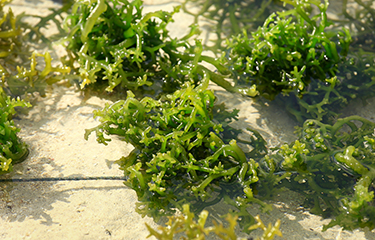New report dives into seaweed production and its untapped European potential

A new report from the Seaweed for Europe Coalition finds that the economic potential of the European seaweed sector could be worth as much EUR 9 billion (USD 10.6 billion) and create 115,000 new jobs by 2030 – more employment than the entire European aquaculture sector offered in 2017.
The report, “Hidden Champion of the Ocean: Seaweed as a Growth Engine for a Sustainable European Future,” also looks at the environmental and health benefits a scaled-up industry would bring.
Asia currently accounts for 99 percent of the world’s seaweed production, but the study estimates that with the right combination of investment, technology, and enabling policies, European seaweed production could grow from 300,000 metric tons (MT) today, to around 8 million MT within 10 years.
“Seaweed can play a role in a sustainable post-COVID-19 green recovery and contribute to a European Green Deal to drive both economic growth and sustainability,” Seaweed for Europe Co-Chair and Special Envoy for the Ocean of the Norwegian Ministry of Foreign Affairs Vidar Helgesen said.
Seaweed has long been recognized as a nutritious human food, and an important nutrient-rich base for animal feed. These two segments have the highest potential for growth, along with biostimulants for agriculture and horticulture use, according to the report. Other current and potential uses of seaweed include cosmetics, bio-packaging, biofuel, textiles, detergents, and green construction materials.
The projected environmental benefits of increased production in Europe include the removal of up to 20,000 MT of nitrogen and 2,000 MT of phosphorus per year, along with increased food and habitat provision for fish.
The industry could also offset the greenhouse gas emissions of up to 800,000 Europeans per year, based on emissions avoided by the animal feed, biopackaging, and biofuel segments.
Development of seaweed biopackaging has exciting potential as a more sustainable, marine safe alternative to existing plastic materials.
Importantly, the seaweed sector would support the majority of the United Nations Sustainable Development Goals (SDGs).
With such acknowledged benefits, and a wild harvest industry already in existence, the report examined why seaweed farming still has not developed at-scale in Europe. It found that current methods make European seaweed production expensive, while the supply chain to market is fragmented. Small-scale producers and processors are unwilling to scale up, because they cannot rely on long-term, price-stable outlets, while large-scale buyers for food and beverage or cosmetic applications, cannot source the volumes they need. As such, reliance on Asia continues, according to the report.
Growth of the magnitude envisaged would need more cost-efficient farming and processing methods that also meet expectations of sustainable farming criteria, the report said.
Seaweed for Europe Co-Chair and former European Commissioner for Maritime Affairs and Fisheries Maria Damanaki has identified a further issue holding up development.
“To realize the full potential of seaweed, policymakers need to understand the value at stake and adapt policies to create the conditions that will allow it to thrive,” she said.
Considerable investment will also be needed to grow the industry, according to Maren Hjorth Bauer, who serves as co-chair of Seaweed for Europe, founder of Fynd Ocean Ventures, and co-founder of Katapult Ocean.
“Policymakers and investors hold the key to unlocking the value of the seaweed industry in Europe, and such an investment would yield dividends for business, the environment and society,” Bauer said.
To deal with the barriers to growth and create the necessary pre-conditions for sustainable development, Seaweed for Europe is launching a six-action program that aims to optimize the seaweed farming licensing process, attract public and private investors, create a strong and collaborative stakeholder network, raise awareness of the benefits and potential of seaweed, establish robust safety standards and a comprehensive certification system, and leverage science to accelerate innovation.
The Seaweed for Europe coalition brings together more than 40 influential stakeholders from the seaweed value chain, investment world, science, academia, and civil society. The coalition’s report is supported by Prime Minister of Norway Erna Solberg, and Peter Thomson of Fiji, the U.N. Secretary General’s Special Envoy for the Ocean.
“We are seeing growing momentum and energy across Europe on seaweed,” Seaweed for Europe Program Director Adrien Vincent said. “Our coalition is poised to mobilize the right decision makers and resources to fully realise seaweed’s potential in Europe.”
Photo courtesy of Eo naya/Shutterstock






Share